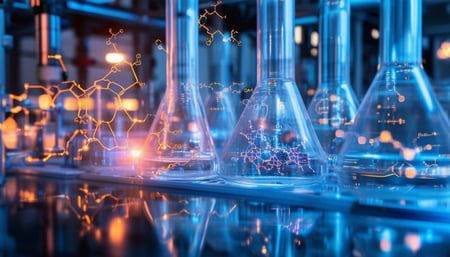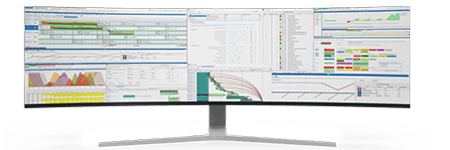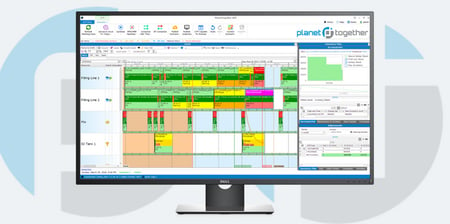Leveraging AI and Machine Learning in Chemical Manufacturing
Artificial Intelligence (AI) and Machine Learning (ML) are transforming the chemical industry landscape, reshaping the potential for data-driven decision-making, operational efficiency, and innovation. Manufacturing IT Managers in chemical facilities face unique challenges and opportunities as they seek to integrate these technologies into existing workflows and systems. A key aspect of this journey involves integrating advanced solutions like PlanetTogether with established ERP systems such as SAP, Oracle, Microsoft, Kinaxis, and Aveva.
In this blog, we’ll explore the impact of AI and ML in chemical manufacturing, focusing on how IT managers can drive operational success through system integration, data connectivity, and predictive insights.

AI and Machine Learning in Chemical Manufacturing
AI and ML offer a wealth of possibilities for the chemical industry. By leveraging vast amounts of production, quality, and supply chain data, these technologies can identify patterns, predict outcomes, and drive improvements. Some of the key areas where AI and ML are making a difference in chemical manufacturing include:
Predictive Maintenance: By analyzing equipment performance data, AI can predict when machines are likely to fail, allowing for maintenance scheduling that minimizes downtime.
Quality Control: Machine learning algorithms can analyze production data to spot trends that might lead to quality issues, enabling preventive adjustments.
Supply Chain Optimization: AI can identify bottlenecks, improve inventory management, and streamline distribution processes, making the supply chain more resilient and responsive.
Process Optimization: By continuously analyzing production data, AI can optimize chemical processes to increase yields, reduce waste, and improve energy efficiency.
Safety and Compliance: AI models can help identify safety risks and ensure regulatory compliance, both crucial aspects of chemical manufacturing.
![]()

Integrating AI and ML through PlanetTogether and ERP Systems
To unlock the potential of AI and ML in a chemical manufacturing environment, IT managers must ensure seamless integration between manufacturing execution systems like PlanetTogether and ERP systems such as SAP, Oracle, Microsoft Dynamics, Kinaxis, and Aveva. Integrating these systems is essential for harnessing the power of real-time data and aligning production schedules, resource management, and analytics capabilities.
Why Integrate PlanetTogether with ERP Systems?
PlanetTogether’s Advanced Planning and Scheduling (APS) capabilities provide production insights that are essential for aligning manufacturing processes with organizational goals. When combined with ERP systems, this integration enables:
Centralized Data Access: By unifying data across systems, IT managers can provide decision-makers with a comprehensive view of production, resources, inventory, and more.
Enhanced Analytics and Reporting: The integration facilitates real-time analytics, providing actionable insights that can improve production planning and resource allocation.
Automated Workflows: Integrating PlanetTogether with ERP systems allows for the automation of routine tasks, reducing manual work and improving efficiency.
Scalability and Flexibility: As manufacturing needs evolve, integrated systems can easily scale, adapting to changes in demand or production requirements.
Let’s look closer at how AI and ML can further enhance this integration.

Implementing AI and ML in the PlanetTogether-ERP Ecosystem
1. Predictive Maintenance and Downtime Prevention
Through the integration of PlanetTogether with ERP systems like SAP, AI-driven predictive maintenance becomes a feasible reality. With continuous monitoring and real-time data analysis, machine learning algorithms can identify patterns and indicators of equipment wear and tear. By scheduling maintenance precisely when it’s needed, the facility can reduce unexpected downtime and extend the lifespan of equipment.
Example: A machine’s vibration data can be tracked and analyzed using ML models. If the ERP system records spikes in vibration, PlanetTogether can adjust production schedules to allow for preventive maintenance, avoiding costly interruptions.
2. Real-Time Quality Control
Quality assurance is paramount in chemical manufacturing, where minor variances can have significant effects. AI models can monitor key production parameters (e.g., temperature, pressure, pH levels) in real-time, identifying deviations from established norms.
By integrating PlanetTogether with an ERP system like Oracle, AI can help maintain consistent quality standards, adjusting production schedules or halting processes when anomalies arise. The combination of PlanetTogether and Oracle can further enhance reporting, with insights into when and why quality issues might occur, enabling proactive interventions.
3. Optimizing the Supply Chain with Data-Driven Insights
Supply chain agility is critical in the face of fluctuating demand, raw material shortages, and logistic disruptions. AI algorithms can analyze historical and real-time data from ERP systems (like Kinaxis) to optimize the entire supply chain, from raw material procurement to delivery. With PlanetTogether, this integration enables IT managers to adapt production schedules based on current supply chain realities, improving overall efficiency.
For instance, in times of raw material scarcity, AI can forecast demand patterns, and PlanetTogether can adjust production plans to prioritize essential products, ensuring supply chain continuity.
4. Streamlining Energy and Resource Utilization
Chemical manufacturing is resource-intensive, making energy optimization crucial. AI can analyze historical production data to recommend energy-saving strategies, such as adjusting production schedules during off-peak hours or optimizing resource allocation. By integrating PlanetTogether with Aveva’s ERP system, IT managers can monitor energy usage in real-time and dynamically adjust production schedules to conserve resources.
In this way, the PlanetTogether-Aveva integration supports sustainability goals and reduces operational costs by aligning production plans with energy-saving strategies identified through AI.
5. Enhancing Safety and Regulatory Compliance
Chemical manufacturers must adhere to stringent safety and regulatory standards. AI-driven systems can monitor compliance in real-time, ensuring that production processes meet legal and safety requirements. When integrated with SAP or Oracle ERP systems, AI algorithms can cross-reference production data with regulatory standards, flagging potential compliance issues early.
With PlanetTogether, IT managers can then adjust schedules or processes to address compliance concerns without significant disruptions, safeguarding both employees and the company’s reputation.

Key Considerations for IT Managers Implementing AI-Driven Integration
For IT managers in chemical manufacturing, implementing AI-driven integration between PlanetTogether and ERP systems requires strategic planning and attention to several factors:
Data Quality and Availability: AI and ML models are only as good as the data they’re trained on. Ensuring data quality, consistency, and completeness is crucial for effective predictive analytics and machine learning applications.
Cybersecurity: With increased data integration comes the need for robust cybersecurity. Sensitive production data must be safeguarded to prevent unauthorized access or tampering.
Scalability: As AI applications grow in complexity, the systems supporting them must be able to scale. Both PlanetTogether and ERP systems should be configured to handle increased data loads and computational demands.
User Training and Adoption: Training staff on new AI-driven tools and technologies is vital. Ensuring that production and maintenance teams understand the capabilities and limitations of these tools is essential for maximizing their impact.
Continuous Improvement and Iteration: AI and ML models require ongoing updates to stay relevant and effective. IT managers should work with data scientists to continuously refine models based on new data, evolving operational needs, and industry standards.
For Manufacturing IT Managers in chemical manufacturing, integrating AI and ML with systems like PlanetTogether and ERP platforms (SAP, Oracle, Microsoft Dynamics, Kinaxis, or Aveva) offers immense potential. Through predictive maintenance, real-time quality control, supply chain optimization, and resource efficiency, AI is transforming the operational landscape of chemical production.
By thoughtfully implementing AI-driven solutions and ensuring seamless integration between systems, IT managers can significantly improve efficiency, drive innovation, and maintain a competitive edge in an increasingly data-driven industry. As these technologies continue to evolve, the chemical manufacturing sector will stand to gain even greater benefits, creating safer, more efficient, and more sustainable production environments.
Are you ready to take your manufacturing operations to the next level? Contact us today to learn more about how PlanetTogether can help you achieve your goals and drive success in your industry.
Topics: PlanetTogether Software, Integrating PlanetTogether, Data-Driven Insights, Optimizing the Supply Chain, Chemical Manufacturing, Real-Time Quality Control, Predictive Maintenance and Downtime Prevention, Streamlining Energy and Resource Utilization, Enhancing Safety and Regulatory Compliance




















LEAVE A COMMENT